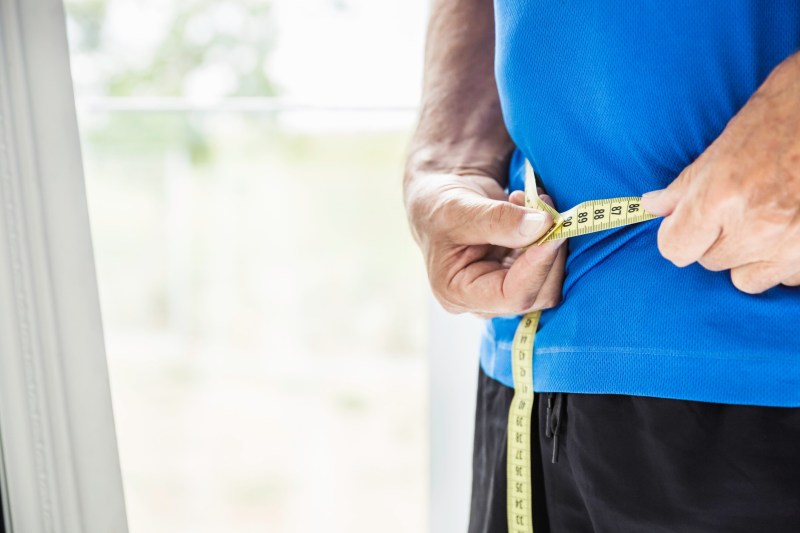Creatine is a popular supplement for building muscle and improving people’s workouts. Some bodybuilders and influencers swear it’s the secret to their impressive gains. But what about other fitness goals? Does creatine help you lose weight? As a trainer and nutritionist, I frequently get this question from my clients who are considering the supplement.
In this article, we’ll take a look at what creatine is, what it’s used for, and whether it can lead to weight loss. We’ll also discuss other things you can do to lose weight in a healthy and sustained way. Let’s get started!
What is creatine?

Creatine is a compound found in your body, mostly in your muscles. It’s made of three amino acids: arginine, glycine, and methionine. It’s required for your body to generate energy.
You might remember from high school that your body creates energy using a molecule called adenosine triphosphate, or ATP. ATP is like a tiny little battery. Your cells turn ADP (adenosine diphosphate) into ATP, using a little energy to do so, and when they turn ATP back into ADP, it releases the energy again. Creatine is part of the process that turns ADP into ATP, storing energy in your cellular batteries.
Does creatine help you lose weight?

Creatine is usually taken for exercise and even bodybuilding purposes. Since it helps your cells create and store energy, especially in the muscles, creatine can improve your workouts, giving you more speed, power, and endurance.
It’s not usually taken for weight loss or marketed for weight loss purposes, but it may be helpful. For example, creatine can give you more endurance and energy for working out to lose weight. However, creatine doesn’t influence weight directly.
What are the other benefits of creatine?

Increasing muscle performance
The most important benefit of creatine is its effect on muscle performance. Since it’s used to create energy in your muscles, supplementing with creatine can give your muscles more energy, strength, and stamina.
Reducing fatigue
Creatine has been shown to reduce fatigue, specifically while exercising. One study showed that people who took creatine had less fatigue after multiple sets of exercises. That suggests that you’ll see better performance and effectiveness towards the end of your workout if you supplement with creatine since you won’t become tired as easily.
Promoting brain health
Surprisingly, creatine can also reduce the risks of certain types of mental decay. In one study, the authors write that creatine supplementation is “neuroprotective” and that “dietary creatine supplementation has been associated with improved symptoms in neurological disorders defined by impaired neural energy provision.” In other words, creatine prevents some neurological disorders, and it reduces symptoms in existing disorders that involve a lack of mental energy.
Do any supplements help with weight loss?

There are definitely supplements that can help you lose weight. Some weight loss supplements work by increasing your body’s metabolism so you burn calories faster. Others decrease your appetite. Some give you more energy or help you sleep — categories that are surprisingly helpful for weight loss as they can promote alertness and give you more willpower to resist snacks. Many of them do a combination of these things.
While there are benefits of these supplements, they should not be relied on for hitting your weight loss goals. Consistent exercise and a calorie deficit will get you there a lot faster. Also, not all supplements work for everyone, but supplements can help with weight loss in a variety of ways. Creatine, however, isn’t really targeted for weight loss purposes. It may help some people lose weight by improving their workouts, but that isn’t its main use — it’s mostly used for building muscle.
Tips for a healthy weight loss journey

The basic principle of losing weight is to use more energy than you take in. Some people rigidly calculate their calories in and calories out, but that isn’t always necessary. All you have to know is that there are two fundamental ways to lose weight: eat less and exercise more. Most healthy weight loss journeys involve both.
The simplest way to take in fewer calories is to reduce or eliminate snacks or replace them with healthier options. Meal planning and cooking your own food are also good ways to eat healthier and feel more satiated. This will lead you to consume smaller portions and take in fewer calories.
When it comes to exercise, some simple tips can make it easier to lose weight. Ideally, you want your routine to consist of both cardio and strength training exercises. Cardio will help you burn calories, while strength training will help you build muscle, contributing to a faster metabolism and improved physique. If you aren’t a gym fan, there are many alternatives you can try. Find a form of exercise that’s more fun for you — walking around your neighborhood, playing pickup basketball, or even rapid-movement VR games.
Frequently asked questions

Does creatine help to lose belly fat?
Unfortunately, no form of supplementation can help you target belly fat. Creatine can generally promote weight loss, but it’s not an easy fix. All it does is support your workouts and give you the energy to keep going. You will still have to put in the work.
Does creatine make you look slimmer?
Sometimes, creatine can make you look slimmer because of how it affects your performance while exercising. You may be losing weight or putting on muscle a bit quicker, leading to a slimmer and more toned appearance.
What are the negatives of creatine?
While there aren’t many recorded adverse effects, creatine has been associated with bloating. Some people also say it makes them sleepy, which is an unusual effect since creatine normally reduces fatigue. For most people, the side effects are reduced by taking creatine with food, and this also improves its absorption into the body.




